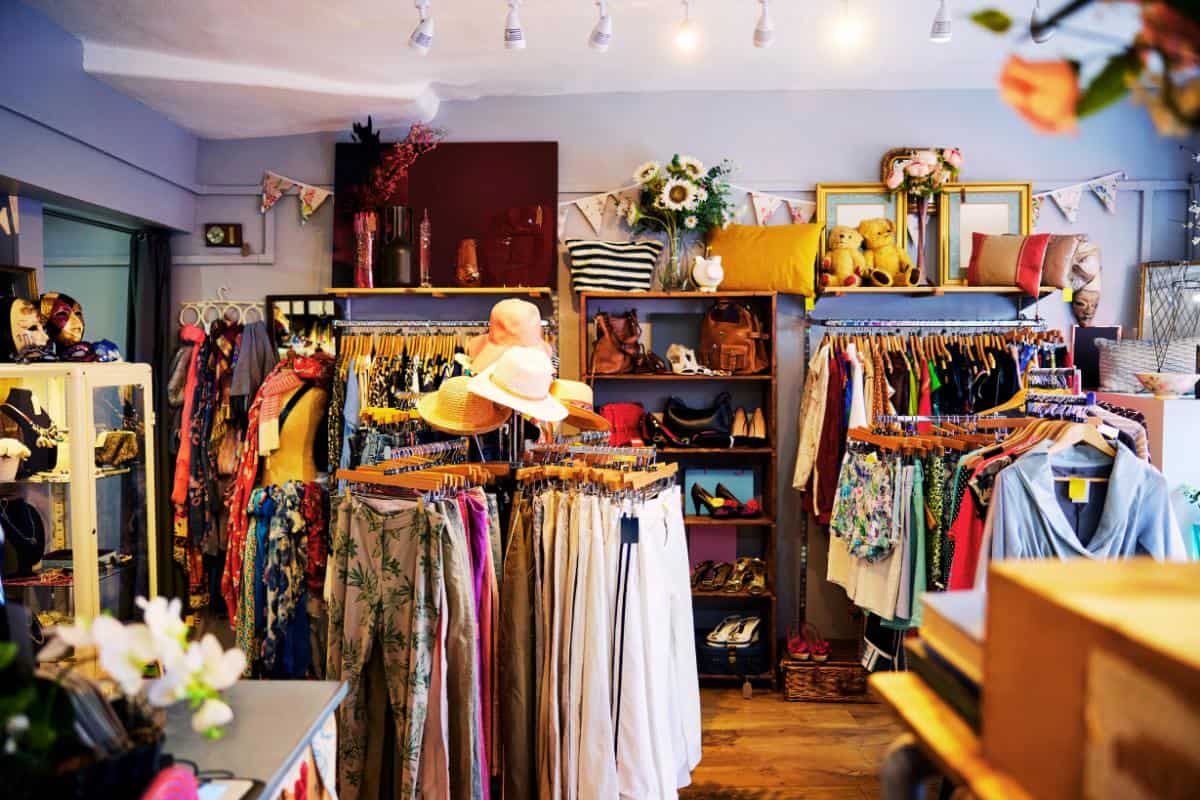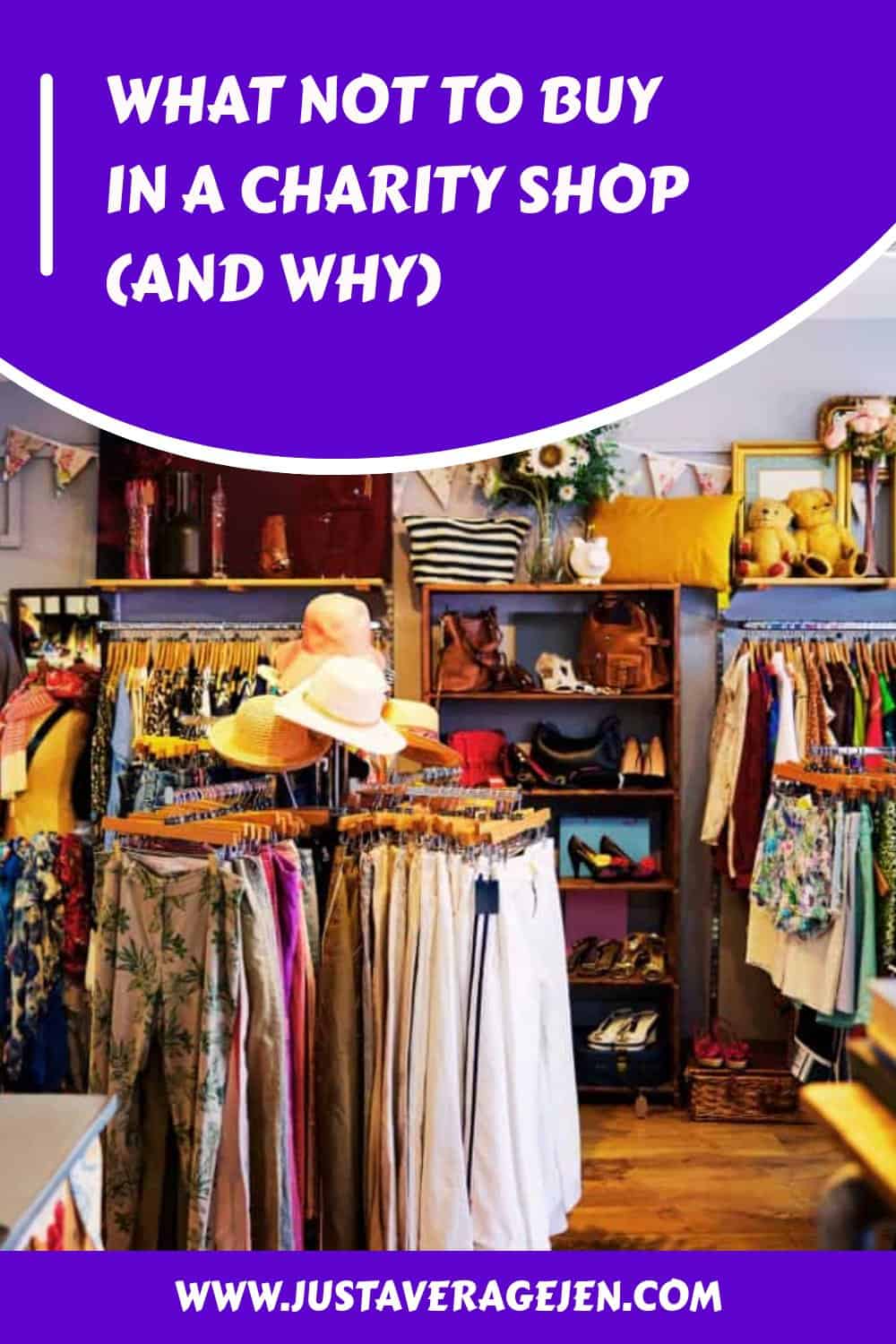I love a Charity shop and have encouraged Ben to do the same. They are a great way to buy things cheaply and also help the environment as less waste goes to landfills. They offer everything from vintage clothing to unique homeware, all at a fraction of their original price. Not to mention, shopping second hand supports good causes. But while an incredible deal can be tempting, there are some things you should think twice about grabbing from a charity shop.
From safety concerns to hygiene issues, certain items might not be the treasures they seem. Here I share the top things you shouldn’t buy in a charity shop and why, so you can shop smart, save money, and avoid any potential regrets.

Why Be Cautious About Certain Charity Shop Finds?
Shopping sustainably and saving money is always a good idea, but there are some second hand items that can come with risks. These might include health hazards, cleanliness concerns, or issues with quality and functionality. While many charity shops do their best to carefully inspect and clean their donations, some items just aren’t worth the bother.
Charity Shop Finds to Avoid
Here are the main categories of items you should generally steer clear of in charity shops.
1. Mattresses and Bedding
While some charity shops don’t even accept mattresses, others may have used bedding or second hand mattress toppers on offer. However, buying these items comes with a substantial risk of hidden issues.
- Hygiene Concerns: Mattresses and bedding can house dust mites, bacteria, and even bed bugs. No matter how thoroughly they’ve been cleaned, these problems aren’t always visible.
- Wear and Tear: Mattresses lose support over time, and a second hand one is likely already past its prime, contributing to poor sleep and potential back issues.
Alternative Tip: Consider buying second hand bed frames and pair them with a fresh, new mattress. Duvet covers that can be washed at a high temperature are a great buy if you see a set you like.
2. Upholstered Furniture
That vintage armchair may look like a bargain, but upholstered furniture can bring hidden headaches.
- Pests: Upholstered items like sofas and armchairs can harbour pests like bed bugs and fleas.
- Stains and Odours: Even seemingly clean upholstered furniture can carry lingering smells or stains you can’t get rid of.
Alternative Tip: Stick to solid wood furniture, which can often be refinished or repurposed beautifully, without the risk of concealed nasties. Another option may be furniture that has completely removable upholstery that you could replace.
3. Helmets and Safety Gear
When it comes to safety equipment like bike helmets or child car seats, charity shop finds are a big no.
- Safety Risks: Helmets and car seats are designed to withstand only one impact. If they’ve been involved in an accident, their structural integrity could be compromised, even if they appear fine.
- Expiration Dates: Many safety items have an expiry date due to materials degrading over time.
Alternative Tip: For safety gear, it’s always better to buy new and ensure you’re purchasing something that will fully protect you. Check for deals online and discount codes to save money on new instead.
4. Small Kitchen Appliances
A £5 toaster might seem like a bargain, but small kitchen gadgets can be hit or miss. That said, some larger charity shops may have an electrician who tests items for them, so it is worth asking this.
- Electrical Issues: You can’t always ensure second hand electrical goods are in safe, working order, especially without a PAT (Portable Appliance Testing) sticker.
- Wear and Tear: Years of use could have worn down internal components, making the appliance less reliable or even dangerous (and more likely to break soon after you bring it home).
Alternative Tip: Check out charity shops for durable items like cast iron pans or other non-electrical kitchen tools. They tend to hold up well and can often be restored to their former glory.
5. Shoes
While pre-loved fashion is great for sustainability, shoes are a category you may want to reconsider.
- Foot Health: Shoes mould to their previous owner’s feet over time. Wearing them could result in improper support for your feet.
- Odour and Cleanliness: Used shoes can carry bacteria or fungus, which isn’t ideal for your health.
Alternative Tip: Bags, hats, and scarves are better second hand fashion finds, offering unique style without the same hygiene concerns.
6. Non-Stick Cookware
Non-stick pots and pans are a common charity shop find, but they often come with hidden downsides.
- Scratches and Flaking: Any damage to the non-stick coating means your cookware is not only less effective but potentially unsafe. Flaking non-stick materials could end up in your food!
- Limited Lifespan: Non-stick cookware typically has a relatively short lifespan and may already be nearing the end of its usability by the time it’s donated.
Alternative Tip: Opt for stainless steel or cast iron cookware at the charity shop; these materials last longer and are easier to clean and maintain.
7. Baby Products
Items like cots, prams and pushchairs, and highchairs might seem like smart second hand purchases, but caution is key here.
- Safety Recalls: Some older baby products might not meet current safety standards or could have been recalled.
- Hygiene Concerns: Babies are messy, and items with fabric, padding, or small parts can be hard to clean thoroughly.
Alternative Tip: Go for second hand baby clothes instead. They’re often lightly worn and can save you a fortune compared to buying new.
8. Makeup and Skincare
Yes, even beauty products sometimes make their way to charity shops, but this is a no-go.
- Hygiene Risks: Used makeup can harbour bacteria, increasing your risk of skin infections.
- Expiration Dates: Expired skincare and makeup are less effective and can sometimes even cause harm to your skin.
Alternative Tip: New, sealed beauty products are a better bet. Some charity shops stock brand-new donations or discounted products.
9. Electronics
Old TVs, DVD players, and other electronics might not be worth the trouble.
- Functionality Issues: There’s no guarantee the item will work, and repairs can quickly outweigh the cost savings.
- Updated Technology: Many older electronics are obsolete or incompatible with modern equipment.
Alternative Tip: Look for second hand games or albums instead, which are often inexpensive and don’t suffer from the same technical issues.
10. Underwear and Swimwear
It may seem obvious, but it bears repeating. While charity shops are fantastic for finding vintage coats, retro T-shirts, or designer bargains, items like underwear and swimwear fall firmly into the “just don’t” category.
- Hygiene concerns: Even with a thorough wash, these items may harbour bacteria or stains you’d rather not deal with.
- Comfort and support: Many of these items, especially underwear, lose their elasticity and form after repeated wear, meaning they simply won’t offer the comfort or support you need.
Alternative Tip: Invest in new, affordable underwear and swimwear from ethical or sustainable brands that prioritise quality over quantity.
While there are some things you shouldn’t buy, charity shops are still an incredible resource for sustainable shopping. By focusing on items that are durable, easy to clean, and free of hidden risks, you can bag yourself some truly unique finds while shopping responsibly.
Remember, second hand doesn’t mean second best when you know what to look for and what to avoid.



